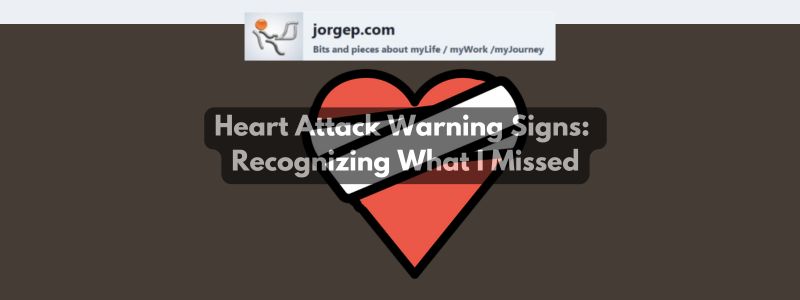Heart Attack Warning Signs: Recognizing What I Missed

Looking back, I realize my body was trying to tell me something wasn’t quite right in the weeks before my heart own attack. Like many of us, I brushed these signals aside, chalking them up to a busy schedule, getting older, or maybe coming down with something. I’m sharing these common warning signs because awareness made all the difference for me, and I hope this information might help you or someone you care about recognize these symptoms early.
This is part of my Heart & Health Series
Common Heart Attack Warning Signs to Watch For
I know a lot has been said about this in the past, but it is never a bad time for a refresher!
Shortness of Breath
When your lungs don’t receive enough oxygen, your heart isn’t getting the blood it needs. I found myself pausing during routine activities, catching my breath in situations that had never winded me before.
Cold and Flu-Like Symptoms
Many heart attack survivors report experiencing what they believed was a minor illness in the weeks before their cardiac event. These symptoms can be easy to dismiss as seasonal bugs.
Chest Pressure
This classic warning sign doesn’t always present as severe pain. Sometimes it’s just discomfort, tightness, or a sensation that something isn’t right in your chest area. This symptom, above all others, deserves immediate medical attention.
Persistent Weakness
When arteries narrow, muscles don’t receive adequate blood flow. The resulting fatigue isn’t resolved by rest. This constant weakness was affecting my quality of life long before my actual heart attack.
Dizziness and Cold Sweats
Poor circulation disrupts blood flow to the brain. I experienced episodes of lightheadedness accompanied by sudden cold sweats that I rationalized away—another critical mistake.
Unusual Drowsiness
Despite sleeping, I never felt rested. This persistent drowsiness continued for days, a sign that my heart wasn’t effectively pumping blood throughout my body.
Mood Swings and Decreased Patience
Perhaps most surprising was how short-fused I became (my wife definitely noticed!). My tolerance for minor frustrations plummeted, and family members noticed my unusually short fuse. I now understand these mood changes were my oxygen-deprived brain struggling to function normally.
The Importance of Early Action
I felt many of these symptoms in the weeks leading up to my cardiac event but failed to connect the dots. That’s the insidious nature of heart disease—it announces itself in ways we’re tempted to ignore or explain away.
Prevention and early intervention dramatically improve outcomes for heart attack patients. If you recognize these warning signs in yourself or someone you love, don’t wait for them to worsen or for the “classic” heart attack symptoms to appear. I was lucky! I could have been much, much worst! Consult a healthcare provider immediately.
Your body speaks to you long before a crisis. Learning to listen could save your life—
Please listen to your body and your spouse!
Resources:
American Heart Association | To be a relentless force for a world of longer, healthier lives
Heart Attack Tools and Resources | American Heart Association
Healthy Heart Resources – NUHCS | National University Heart Centre, Singapore
